Table of Contents
Get started with MyPerfectResume today!
- Build a resume on any device
- Pick an ATS-friendly template
- Tailor with AI copy suggestions
Why this resume works
- Quantifies accomplishments: By pulling metrics like boosting portfolio growth by 20% and reducing expenditures monthly, the applicant’s resume accomplishments showcase impactful financial contributions at each role.
- Highlights industry-specific skills: Including skills such as financial modeling and economic forecasting, the applicant aligns well with finance roles, demonstrating expertise important for investment and revenue optimization.
- Showcases career progression: Progressing from a financial consultant to an analyst demonstrates increasing responsibility and career advancement, highlighting their ability to tackle complex financial challenges in diverse settings.
More Financial Analyst Resume Examples
See our financial analyst resume examples to learn how to highlight your analytical skills, financial modeling expertise, and data interpretation abilities. These finance resume samples will help you craft a resume that meets industry standards and showcases your insights effectively.
Entry-Level Financial Analyst
Why this resume works
- Centers on academic background: The education section features a master’s degree in finance, reflecting a strong academic foundation and highlighting early career achievements in finance.
- Effective use of keywords: Incorporating keywords like “financial modeling” and “budget forecasting” smartly aligns the resume with applicant tracking systems (ATS) criteria for financial roles.
- Shows digital literacy: Excel skill and experience with data analysis tools reveal computer skills that prepare the applicant for tech-driven workplaces.
Mid-Level Financial Analyst
Why this resume works
- Points to measurable outcomes: By quantifying outcomes like a 30% revenue increase and improving forecast accuracy by 25%, the applicant reflects an ability to deliver tangible value through strategic financial decisions.
- Maximizes readability: The effective use of white space and clear resume sections help ATS and recruiters quickly scan the resume.
- Demonstrates language abilities: Knowledge in Spanish, French, and German highlights language skills that support cross-border communication and foster adaptability in globally-focused financial roles.
Experienced Financial Analyst
Why this resume works
- Lists relevant certifications: By integrating top certifications like CFA and FRM, the applicant’s commitment to learning and expertise in finance are clearly supported.
- Focuses on work history: The applicant effectively uses a chronological resume format, emphasizing extensive experience with roles from junior consultant to financial analyst.
- Showcases impressive accomplishments: Highlighting achievements such as reducing operational discrepancies by 25% showcases the applicant’s significant impact in senior-level performance.
Financial Analyst Resume Template (Text Version)
Cameron Henderson
St. Louis, MO 63102
(555)555-5555
Cameron.Henderson@example.com
Professional Summary
Accomplished financial analyst with proven track record in optimizing investment strategies and enhancing revenue forecasts through insightful data analysis and strategic planning.
Work History
Financial Analyst
Beacon Financial Group – St. Louis, MO
July 2022 – July 2025
- Improved revenue forecasts by 15%
- Reduced expenditure by k monthly
- Streamlined financial reporting processes
Investment Specialist
Prime Investment Solutions – St. Louis, MO
July 2020 – June 2022
- Boosted portfolio growth by 20%
- Managed assets over M
- Optimized client investment strategies
Financial Consultant
Evergreen Advisors – Parkview, MO
July 2019 – June 2020
- Enhanced client ROI by 12%
- Conducted financial risk assessments
- Developed strategic financial plans
Languages
- Spanish – Beginner (A1)
- French – Beginner (A1)
- Mandarin – Beginner (A1)
Skills
- Financial modeling
- Data analysis
- Risk management
- Investment strategies
- Budget planning
- Economic forecasting
- Microsoft Excel proficiency
- Research and analytics
Certifications
- Certified Financial Analyst – Financial Analyst Certification Board
- Advanced Investment Management – Global Investment Institute
Education
Master of Business Administration Finance
University of Finance New York, NY
June 2019
Bachelor of Science Economics
State University Los Angeles, CA
May 2017
Related Resume Guides
Advice for Writing Your Financial Analyst Resume
Dive into our tailored advice on how to write a resume for a financial analyst position. Discover tips that help you highlight your analytical skills, financial expertise, and ability to drive smart business decisions.
Highlight your most relevant skills
Listing the right skills help show that you are a good fit for the role. A dedicated skills section on your resume makes it easy for employers to see what you can do.
You should have a mix of technical skills, like data analysis and financial modeling, and soft skills, like communication and problem-solving. This balance shows that you can handle complex tasks and work well with others.
Adding key skills to your work experience section can make your resume even stronger. For example, if you mention creating detailed financial reports in a past job, highlight how your analytical skills helped achieve this.
Or if you led meetings to discuss budgets, note how your communication skills made those meetings successful. By weaving these skills into your job history, you give real examples of how you’ve used them before. This approach paints a clear picture of why you’re a great match for the financial analyst role.
A resume format highlighting analytical skills, financial modeling, and attention to detail can help financial analysts stand out.
Showcase your accomplishments
When organizing your work experience as a financial analyst, list your jobs in reverse chronological order. This means starting with the most recent position and working backward. Each job entry should clearly state your job title, the name of the employer, location, and employment dates. This format helps employers quickly see your career progression.
Instead of just listing what you did at each job, focus on what you achieved. Turn duties into achievements by including measurable results like percentages, time savings, cost reductions, or efficiency improvements. For example, instead of saying “responsible for data analysis,” you could say “increased data processing efficiency by 20% through optimizing tools.”
Use action-oriented words to describe both core duties and measurable achievements. Words like “improved,” “reduced,” or “increased” show active involvement and impact. This approach not only highlights your abilities but also shows potential employers the value you can bring to their team as a financial analyst.
5 financial analyst work history bullet points
- Analyzed financial statements and provided insights that led to a 15% increase in quarterly revenue.
- Developed comprehensive financial models predicting market trends, resulting in a 10% improvement in investment strategies.
- Collaborated with cross-functional teams to streamline budgeting processes, reducing departmental expenses by 8%.
- Conducted risk assessments for potential investments, ensuring a portfolio growth rate of 12% over two years.
- Presented detailed financial reports to senior management, aiding in strategic decision-making and achieving a 20% cost reduction.
Select a resume template with clear sections and readable fonts. Steer clear of excessive colors or elaborate designs to help employers easily notice your skills and experience.
Write a strong professional summary
A professional summary on a resume serves as an introduction to hiring managers and helps them quickly understand who you are. It typically consists of three to four sentences that highlight your experience, skills, and achievements. It’s best suited for experienced applicants and aims to showcase your professional identity and value.
Resume objectives are career goal statements that outline what you aim to achieve in your next role. They’re ideal for entry-level candidates, career changers, or those with employment gaps. Essentially, summaries focus on “what I’ve accomplished,” while objectives focus on “what I aim to contribute.”
Next, we’ll provide examples of both summaries and objectives tailored to different industries and levels of experience.
Financial analyst resume summary examples
Entry-level
Recent finance graduate with a Bachelor of Science in finance from a top-tier university, eager to contribute strong analytical skills and knowledge of financial modeling. Completed CFA Level 1 and gained practical experience through internships focusing on market analysis and data-driven decision-making. Thrives in dynamic environments and passionate about delivering insights that drive financial strategy.
Mid-career
Financial analyst with over five years of experience specializing in corporate finance within the technology sector. Proven track record in conducting detailed financial analysis, budgeting, and forecasting to support organizational growth. Holds an MBA and is known for strategic thinking, attention to detail, and ability to communicate complex financial information clearly to stakeholders.
Experienced
Seasoned financial analyst with 10+ years of expertise in investment banking and portfolio management. Demonstrated success in leading teams to optimize financial performance through risk assessment, asset allocation, and strategic planning. Chartered Financial Analyst (CFA) charterholder recognized for delivering significant revenue growth and guiding companies through mergers and acquisitions while maintaining a focus on sustainable practices.
Financial analyst resume objective examples
Recent graduate
Detail-oriented recent finance graduate with a Bachelor of Science in finance seeking an entry-level financial analyst position to apply strong analytical skills and foundational knowledge of financial markets. Eager to contribute to a dynamic team by supporting data-driven decision-making processes.
Career changer
Driven professional transitioning from retail management into financial analysis, bringing strong problem-solving abilities and experience in budget management. Looking forward to leveraging analytical expertise and business acumen in an entry-level financial analyst role to deliver insights that improve strategic planning.
Specialized training
Aspiring financial analyst with specialized coursework in investment analysis and risk management seeking to join a forward-thinking financial services firm. Passionate about using advanced Excel skills and statistical software skill to assist in developing comprehensive financial strategies.
Create a standout resume quickly! Our Resume Builder helps you highlight your financial skills and experience, making sure you get noticed by employers.
Match your resume to the job description
Tailoring your resume to match job descriptions helps you stand out to employers and get through ATS. These systems scan resumes for specific keywords from the job posting. If your resume includes these keywords, you have a better chance of catching the employer’s attention.
An ATS-friendly resume is one that uses words and phrases from the job description. When these align with your skills, it increases your chances of being noticed by hiring managers. This approach ensures that your qualifications are easily identified by both the ATS and human readers.
To find keywords from a job posting, look for skills, qualifications, and tasks mentioned several times. For example, if you’re applying for a financial analyst position, you might look for terms like “financial modeling,” “data analysis,” or “budget forecasting.” Using exact phrases can make a big difference.
You should include these terms naturally in your resume. For instance, change “analyze financial data” to “conducted detailed data analysis to support business decisions.” This way, you’re using the same language as the employer without forcing it.
Targeted resumes improve compatibility with ATS and increase your chances of getting an interview. By carefully matching job descriptions with your experience, you show employers that you’re a great fit for their needs. To make this process simpler, customize your resume to reflect each specific job description accurately.
Catch errors before they cost you a job! Our ATS Resume Checker helps find formatting mistakes, missing keywords, and other issues so your resume stands out.
FAQ
Do I need to include a cover letter with my financial analyst resume?
Yes, adding a cover letter to your financial analyst resume can make a strong impression and set you apart from other candidates.
It lets you explain why you’re interested in the role, highlight key achievements, and show how your analytical skills match the company’s needs.
For example, if the organization focuses on investment strategy or corporate finance, emphasize relevant experience like forecasting trends or building financial models.
To simplify the process, try using a Cover Letter Generator to create a polished letter that complements your resume and speaks directly to the employer’s requirements.
Also, checking out cover letter examples or reviewing a financial analyst cover letter can help you structure yours effectively for maximum impact.
How long should a financial analyst’s resume be?
For a financial analyst with under 10 years of experience, aim for a one-page resume. Highlight key skills like expertise in financial modeling, data analysis, and tools like Excel or Tableau. Emphasize achievements such as cost savings and efficiency improvements to show your impact.
If you’ve had a long career with specialized roles or certifications (like CFA), consider a two-page resume. Focus on relevant details to avoid overwhelming readers and emphasize accomplishments related to financial analysis.
Check out our guide on how long a resume should be for examples tailored to your experience level and industry focus.
How do you write a financial analyst resume with no experience?
To write a financial analyst resume with no experience, highlight your education, relevant skills, and related coursework or projects that show your potential in the field.
Check out these tips on writing a resume with no experience:
- Emphasize educational background: Start by listing your degree in finance, economics, or a related field. Include key courses like corporate finance, investment analysis, or statistics that are relevant to financial analysis.
- Showcase relevant skills: Highlight skills such as data analysis, financial modeling, skill in Excel or other financial software, and attention to detail. These are important for a financial analyst role.
- Include academic projects: Discuss any significant projects or case studies you’ve completed during your studies that involved analyzing financial data or creating reports. This can demonstrate practical application of your knowledge.
- Mention internships or volunteer work: If you’ve interned at a bank or volunteered for non-profits handling budgets, include these experiences even if they were brief. Focus on what you learned and how it applies to a financial analyst role.
Rate this article
Financial Analyst
Share this page
Additional Resources

Financial Analyst Cover Letter Example + Tips
First, make sure that you are focusing on detailed and tangible industry-specific experience that goes beyond the information provided in your resume. Use specific situations that demonstrate your capabilities. Second,
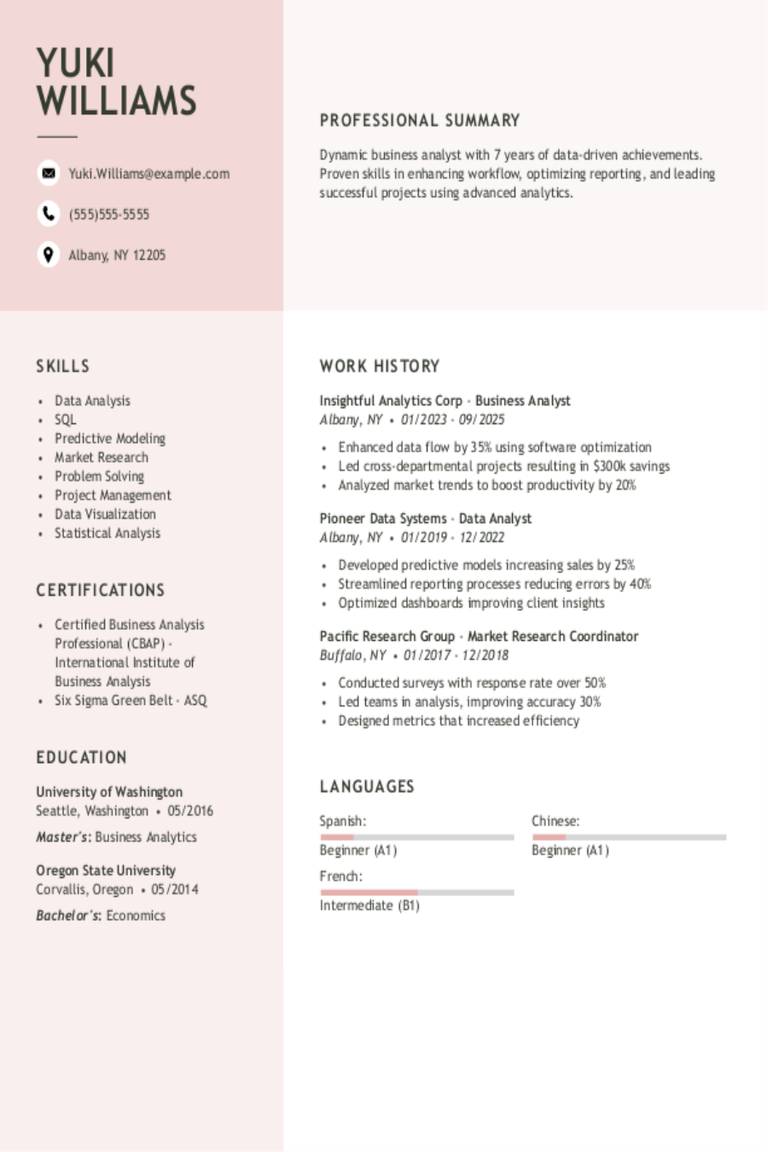
Business Analyst Resume Examples & Templates
Explore business analyst resume examples to see how to showcase your problem-solving, teamwork, and data skills. Browse tips to highlight your experience turning ideas into action and improving processes to
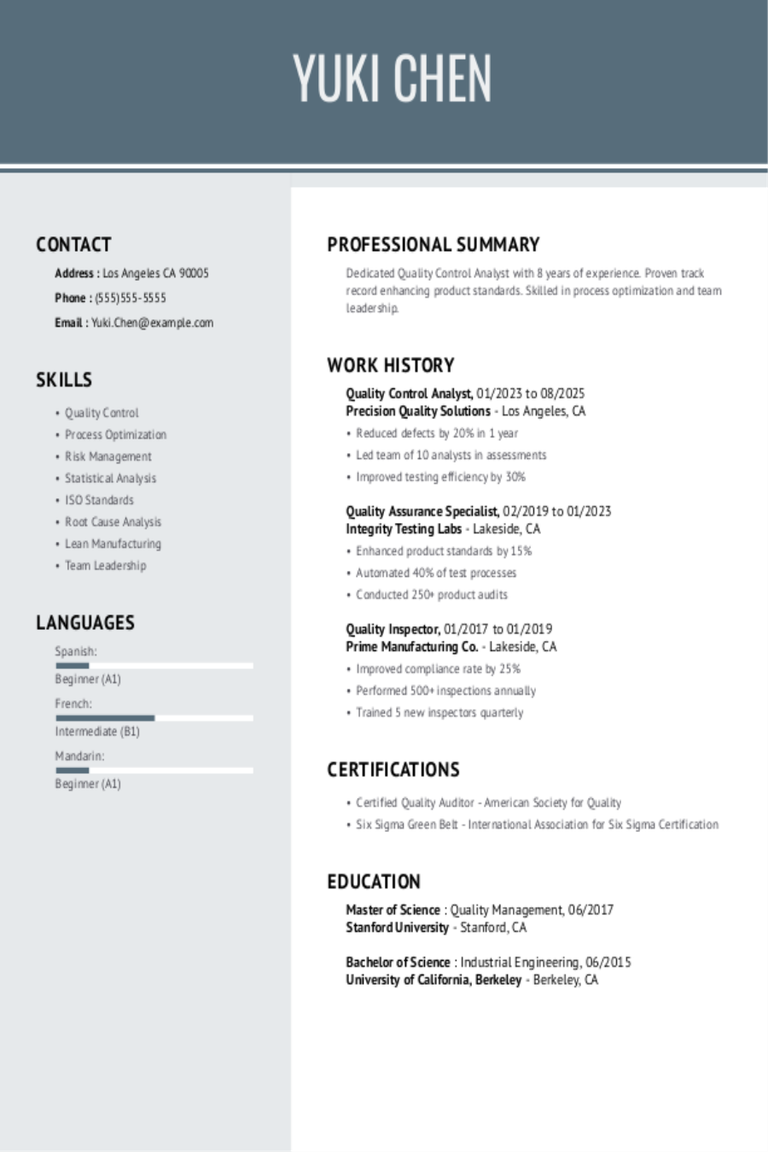
Quality Control Analyst Resume Examples & Templates
Discover how quality control analysts showcase their skills in monitoring products and ensuring standards are met. These resume examples will help you highlight your experience with testing processes and improving
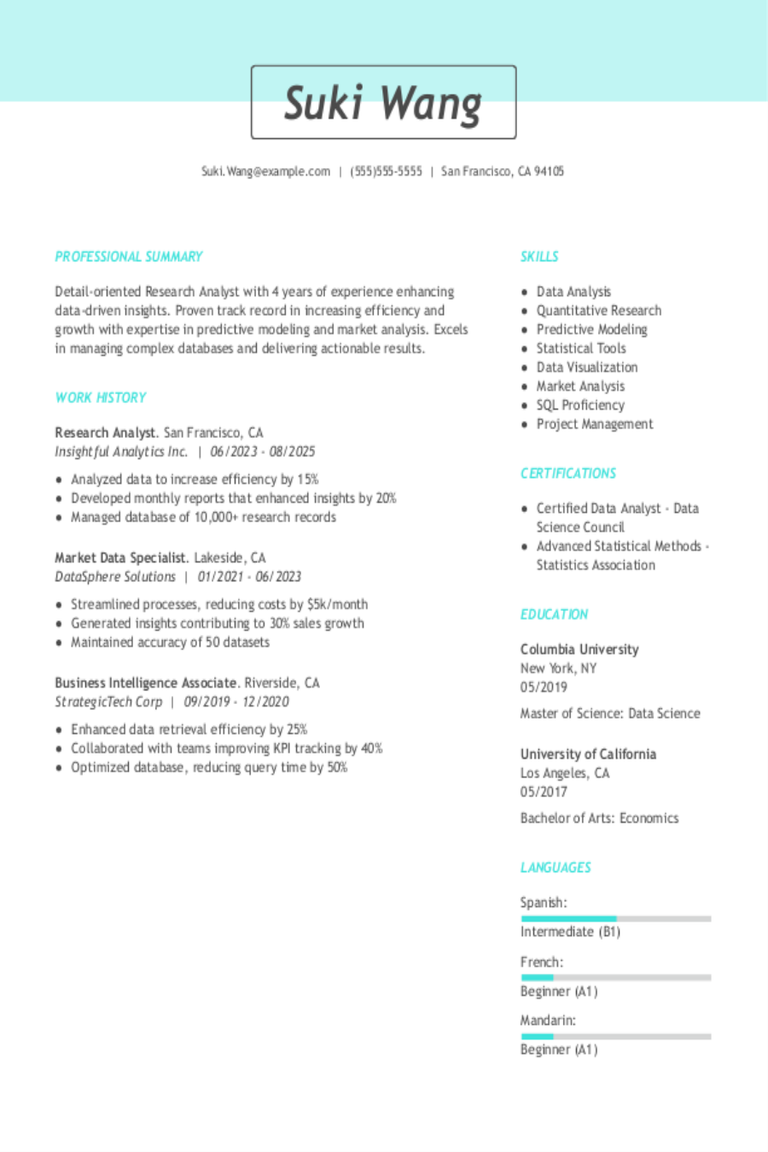
Research Analyst Resume Examples & Templates
Browse research analyst resume examples and learn how to spotlight your skills in data analysis, problem-solving, and research techniques.Build my resumeImport existing resumeCustomize this templateWhy this resume worksQuantifies accomplishments: By
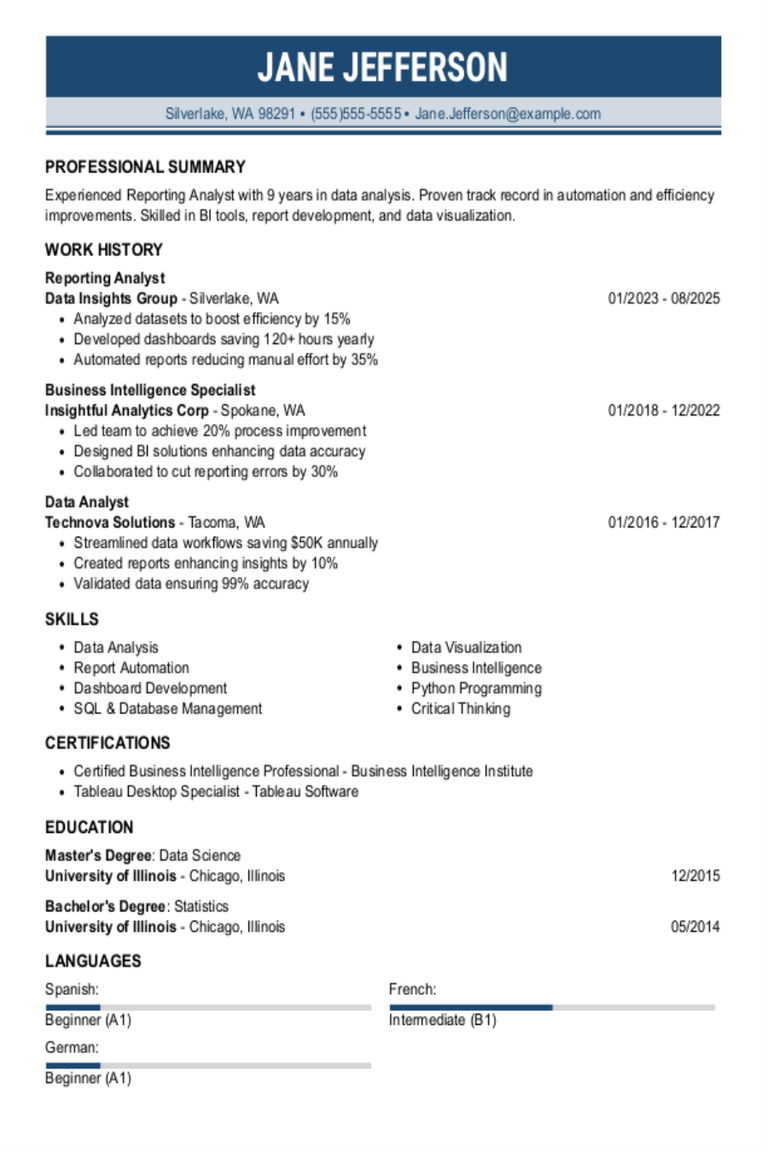
Reporting Analyst Resume Examples & Templates
Discover reporting analyst resume examples and learn to showcase your experience in creating reports and making insights stand out to potential employers.Build my resumeImport existing resumeCustomize this templateWhy this resume
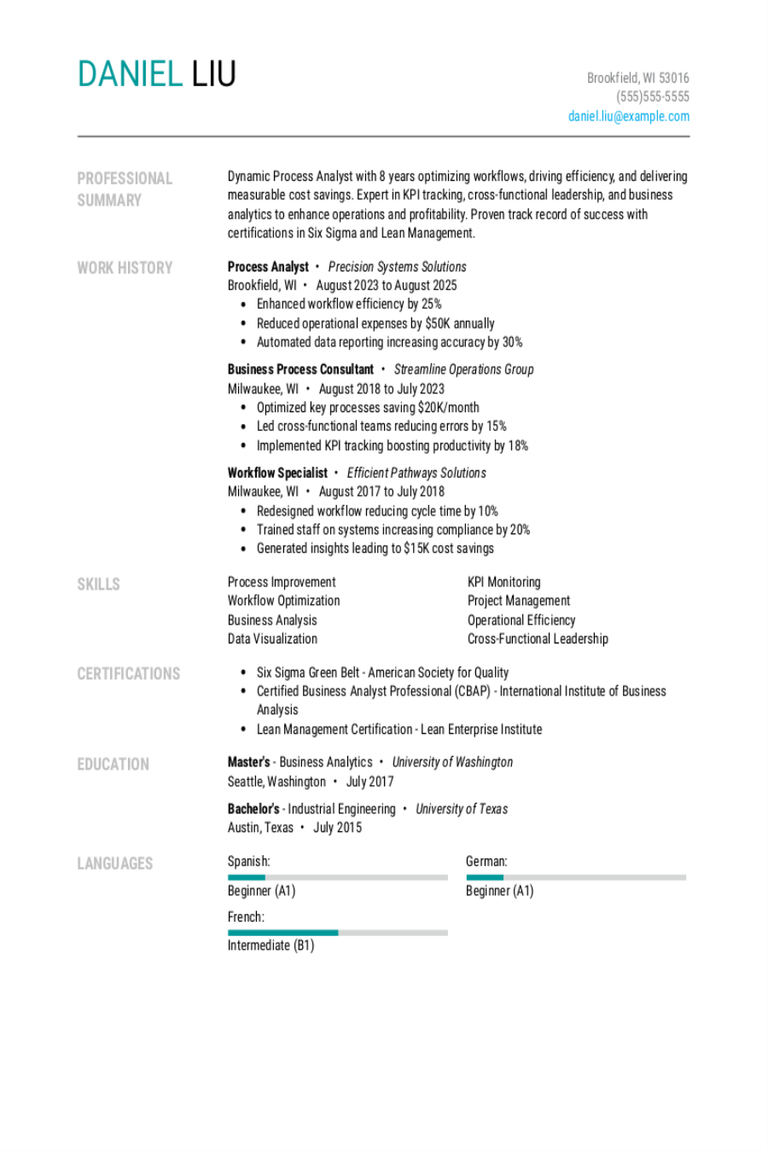
Process Analyst Resume Examples & Templates
Explore process analyst resume examples that show how to spotlight problem-solving and data analysis skills. These tips help you highlight your experience in improving workflows and boosting efficiency.Build my resumeImport
